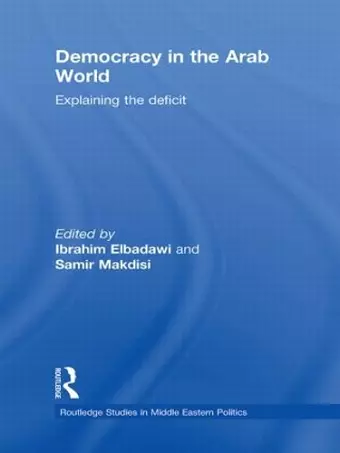Democracy in the Arab World
Explaining the Deficit
Ibrahim Elbadawi editor Samir Makdisi editor
Format:Hardback
Publisher:Taylor & Francis Ltd
Published:10th Sep '10
Currently unavailable, and unfortunately no date known when it will be back
This hardback is available in another edition too:
- Paperback£39.99(9780415587402)

Despite notable socio-economic development in the Arab region, a deficit in democracy and political rights has continued to prevail. This book examines the major reasons underlying the persistence of this democracy deficit over the past decades and touches on the prospects for deepening the process of democratization in the Arab World.
Contributions from major scholars in the region give a cross country analysis of economic development, political institutions and social factors, and the impact of oil wealth and regional wars, and present a model for democracy in the Arab world. Case studies are drawn from Algeria, Egypt, Iraq, Jordan, Lebanon, Syria, Sudan and the Gulf region, building on these cross-country analyses and probing beyond the model’s main global variables. Looking beyond the effect of oil and conflicts, the chapters illustrate how specific socio-political history of the country concerned, fear of fundamentalist groups, collusion with foreign powers and foreign interventions, and the co-option of the elites by the state contribute to these problems of democratization.
Situating the democratic position of the Arab World in a global context, this book is an important contribution to the field of Middle Eastern politics, development studies, and studies on conflict and democracy.
"Democracy in the Arab World is a welcome contribution to the literature examining the democracy deficit in the region. Unlike other studies that deal with democratization, the book zeroes in on the major drivers behind the democracy deficit in various Arab countries and offers a complex set of analytical explanations. Eschewing simplistic dichotomies and culturalist dogma, Democracy in the Arab World diagnosis the critical role of conflicts and oil, but also reveals the influence of political leadership, foreign interventions and the cooption of elites, in inhibiting the democratic process in the region despite its notable socio-economic development. Another major strength of the book is that it bridges the gap between theory and history. An impressive list of researchers and scholars of the region!"
Fawaz A. Gerges, London School of Economics
ISBN: 9780415779999
Dimensions: unknown
Weight: 640g
332 pages